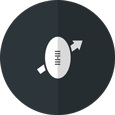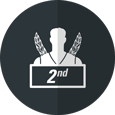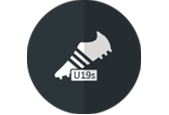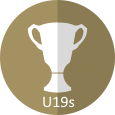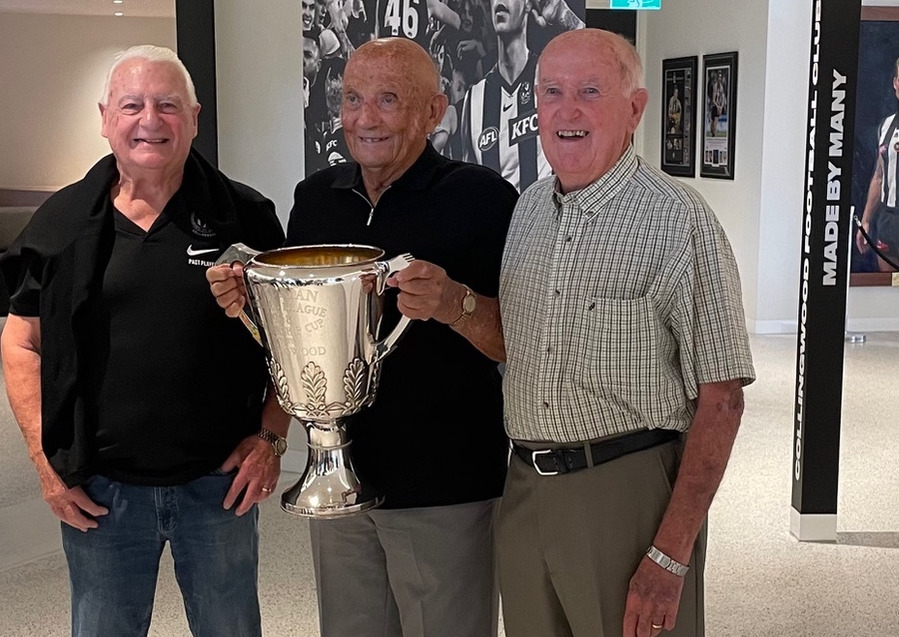
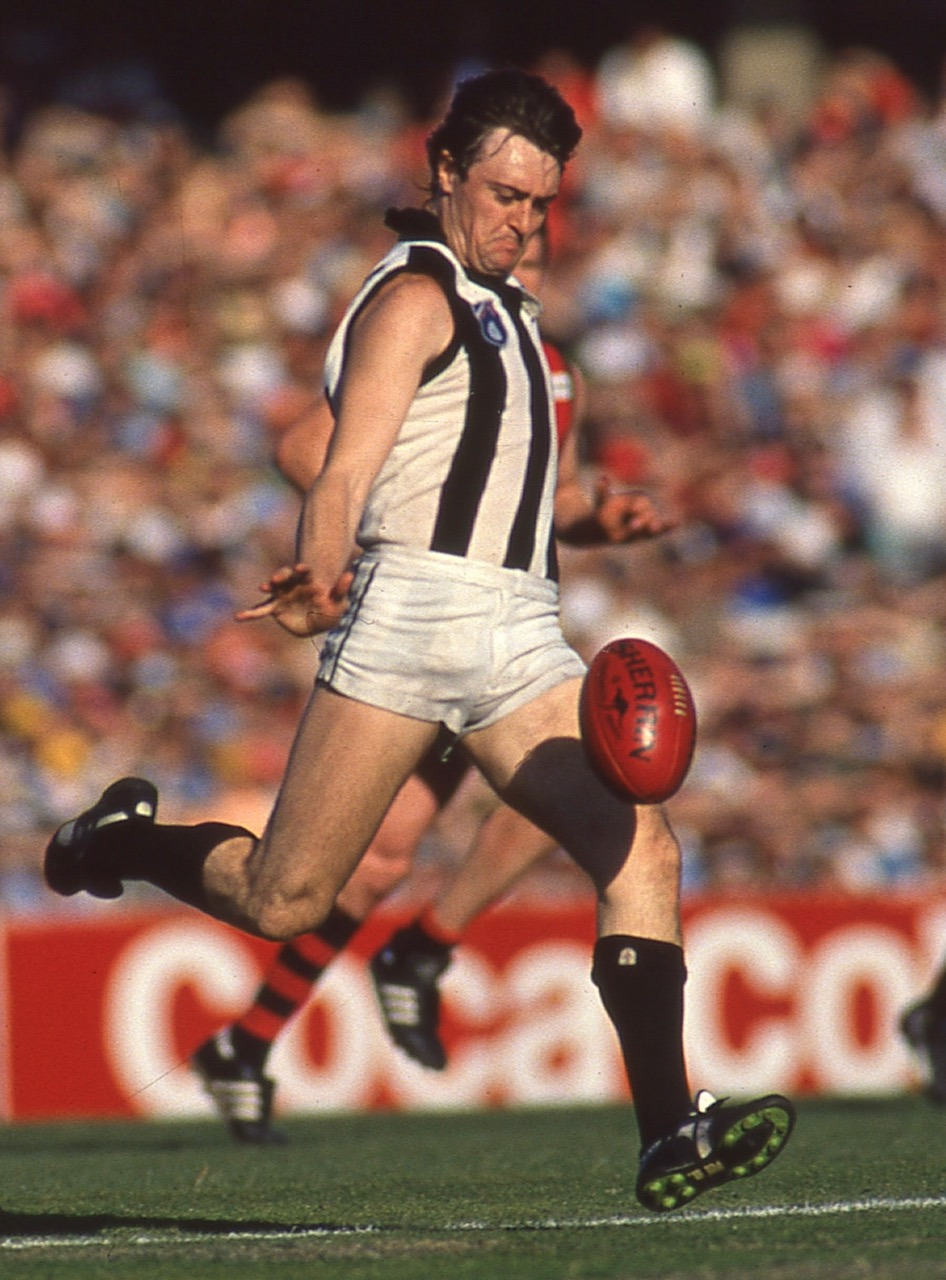
The trouble with being responsible for one of the most famous goals in Collingwood’s history is that it tends to obscure the rest of your achievements.
Take Mick McGuane, for example. His CV across 10 seasons included back-to-back Copeland Trophies, playing a key role in the 1990 Premiership, and winning recognition as one of the club’s favourite sons for his undoubted footy smarts, high-energy spark, and cheeky, larger-than-life nature.
Yet for all of that, ask anyone what they recall most vividly from McGuane’s 152 games in black and white, and most will nominate his part in one of the most spectacular goals in modern memory.
It was Easter Monday in 1994 when Mick zigzagged directly from the centre bounce to deep in the forward line, taking seven bounces to kick 1994's goal of the year. It brought the crowd of 85,603 to their feet in a moment of awe and amazement. He took as many bounces as Ray Gabelich (three) and Phil Manassa (four) did collectively in their strides into football immortality - in the 1964 Grand Final and 1977 Grand Final replay respectively. He is reminded about it almost daily. But the one thing that isn't as regularly recalled is the fact that he was best on ground that day, kicking three goals in the 34-point victory.
That was his specialty, lifting the team when required. He was capable of brilliant individual moments, but when he was at his peak for a period in the early 1990s, there were few more consistent performers in the game.
McGuane's passion for Collingwood dated back to his earliest days.
As a nine-year-old, he locked himself in his bedroom for almost two days after the Magpies lost the 1977 Grand Final replay. His father, Bryan, had a Collingwood connection, kicking four goals on Laurie Hill in a trial game only to be driven back by necessity to the family farm at Bungaree, near Ballarat.
McGuane had shown potential as a kid - his father put a plastic footy under his pillow when he was 18 month old - but cricket also loomed as a potential career. Besides, he knew if he was to play League football, it would have to be with St Kilda, given he was zoned to the Saints from his hometown of Sebastopol.
He played senior football against men as a teenager in the Ballarat Football League, attracting the interest of rival VFL clubs, but for some reason St Kilda let its hold on the young star lapse. Then one day his dad turned up to his school (St Patrick's in Ballarat, Des Tuddenham's former school) to tell him he had just heard from Bill O'Keefe, Collingwood's recruiting officer: he was coming to watch Mick play that day against Ballarat High School. Mick played centre half-forward and kicked something like 13 goals. By 6pm that night he had signed the paperwork at the local post office that effectively made him a Collingwood player.
McGuane played in Collingwood’s 1986 under 19s Premiership side, alongside future stars Gavin Brown, Gavin Crosisca and Damian Monkhorst, and the following year he played three senior matches, wearing the No.54 jumper. By 1988, he had moved to No.34, which placed him in between the lockers of Daicos and David Cloke. He would go on to finish equal second with Shane Morwood in the Copeland Trophy behind Daicos.
He spent much of the season through the middle of the ground, having a career-high 46 touches in his 20th senior game, ironically against St Kilda - the club he could easily have been playing for.
Homesickness saw him move back home and commute during the 1989 season, but it hindered his development and affected his professionalism. "I was driving up backwards and forwards, and even though I wanted to be closer to home, it didn't sit comfortably with the club," he said. "It affected my training, and my fitness levels. On the back of those poor choices, I knew I had to rectify my wrongs in 1990."
McGuane was as good as his word. He became an All-Australian for the first time in 1990 and was one of five Magpies to play every game that season. But he damaged his groin early in the drawn Qualifying Final against West Coast.
"Chris Lewis had an influential role in the second half of that game, so I got on the front foot and spoke to Leigh (Matthews) about doing a run-with role in the replay. He assured me if I wasn't right, I wouldn't play. I knew the weakness (in the groin) was there, but I was prepared to do what I had to. Besides, there was the inspiration of Darren Millane playing with his broken thumb, so I knew that I had to find a way."
Tony Shaw, who once suggested McGuane had more natural talent that any Collingwood player he had seen since Barry Price, said his role on Lewis was crucial: "We put Mick on him, and what a job he did."
McGuane's reward came with a Premiership medal, ending the drought that had frustrated him since he was a kid. But the Magpies, and McGuane, couldn't back it up the following year. He had an injury-interrupted season, playing just five senior games and ending the year in the reserves. Collingwood missed the finals.
But the death of Millane a month later rocked the club, and brought about a profound change in McGuane. He had already started doing pre-season work with Millane before his mate's death in a car accident, and resolved to win the Copeland Trophy in his honour. He followed through on that promise and then went one better, winning a second Copeland the next year. That one was for his own family.
Those years were peak McGuane. His game combined great vision, explosive talent and sublime finishing skills. He was an instinctive reader of the game with a high football IQ (Monkhorst once said that McGuane had the best football brain of anyone he'd seen) who always knew the right places to get to within games. He was a superb user of the ball on both sides of his body, and regularly won heaps of possessions. Indeed he amassed almost 1500 disposals across three seasons (1992-94) before injuries began to take a toll.
A torn calf saw him play only 13 games in 1995, and only five the following year when a ruptured urethra ended his season, briefly threatened his life (he spent 23 days in hospital) and prompted an end to his time at Collingwood. By 1997, McGuane's relationship with Tony Shaw had deteriorated. They met at the Hilton Hotel in an effort to resolve their differences, but it wasn’t to be. McGuane felt he had to leave on principle.
Remarkably, he ended up at Carlton. But his failing body and a few discipline issues meant it was only a three-game postscript to his career.
Collingwood fans prefer to overlook Mick McGuane's brief stint at Princes Park. Instead, they focus on all the great times he lit up the stage in black-and-white. That magical, mazy run in 1994 was one of those times - but it was far from the only one.
- Glenn McFarlane
CFC Career Stats
| Season played | Games | Goals | Finals | Win % |
|---|---|---|---|---|
| 1987-1996 | 152 | 128 | 8 | 57.2% |
CFC Season by Season Stats
| Season | GP | GL | B | K | H | T | D | Guernsey No. | ||
|---|---|---|---|---|---|---|---|---|---|---|
Other CFC Games
| Team | League | Years Played | Games | Goals |
|---|---|---|---|---|
| Collingwood | Night/Pre-season | 1988 - 1994 | 3 | 3 |
| Collingwood | Reserves | 1987 - 1995 | 26 | 24 |
| Collingwood | U19s | 1986 | 15 | 39 |
Also Played For
| Team | League | Years Played | Games | Goals |
|---|---|---|---|---|
| Carlton | AFL | 1997 | 3 | 1 |
Awards
 x2
x2

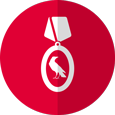
 x2
x2
